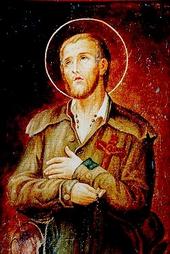"As it is, God has set each member of the body in the place He wanted it to be. If all the members were alike, where would the body be? There are indeed many different members but one body...Even those members of the body which seem less important are in fact indespensible...If one member suffers, all the members suffer with it; if one member is honored, all the members share its joy." (1Cor. 12:18-20,22,26)
SAINT BENEDICT JOSEPH LABRE
died 16 April 1783, Rome
"Judged by any worldly standard, St. Benedict Joseph Labre lived a completely useless life. Absent in his life were the virtues which we have been taught to respect and imitate: industry, respectability, thrift. But his extraordianry sanctity serves to remind us that the world's judgements are not God's.
"Today, perhaps more than ever before, people are bewildered and distressed by the spectacle of so many young people rejecting the values of the societies in which they have been reared and taking to a life of anarchic vagrancy in protest.
"These young people, as they search for meaning in their lives, might well give attention to the positive value St. Benedict Joseph found in his life. He too turned his back upon society, wandered the world as a beggar, and died in abject misery. But long before his pitiable end he had discovered that in this way of life he could love God perfectly, with a love yet more perfectly returned.
"His parents were comftorable farmers and shopkeepers in a village near Boulogne. Delicate and pious from infancy, he would obviously, never make a farmer; so he was sent to live with an uncle, a village parish priest, and to study in preperation for the priesthood. But he soon began to show that he was called to a life of penitential expiation for the sins of the world.
"For some time he hoped that this might be achieved in some monastic order exceptional for its austerity. But the Cistercians and the Carthusians both rejected him; at Septfonts the Cistercians were appalled at the spectacle of his interior sufferings, which, they said, made them fear for his reason.
"So, enfeebled and melancholy, full of sorrow at the distress he knew he was causing his family, the young man set off to wander about Europe. For long, this was with the vague hope that somewhere he would find a monastery which would accept and retain him.
"But little by little this hope seems to have faded as he discovered the prophetic truth of what he had written in a letter of farewell to his parents: that it was God who was calling him to set out on this journey. The journey was only to end in his death.
"When the process for Benedict Joseph's canonization began there were many to tell of his last years, lived in Rome. "The beggar of the Colosseum" was one of his nicknames (few knew who he was for he sought complete isolation). Dressed in filthy rags crawling with vermin, preferring to sleep in any hole or corner unless sickness forced him to accept shelter in some charitable institution, pelted with filth and stones by the professional beggars, who hated him for his silent rebuke of their own dissolute lives, he was the object of contempt and rejection to a degree few others can have known. But this was what he sought and cheerfully embraced. Sorrow was his vocation, and in sorrow he found complete peace.
"To most people all of this may seem strange and reprehensible. But in his lifetime St. Bendict Joseph was granted extraordinary graces in prayer, and at the time of his death (he was then only 35 years old) it was common knowledge in Rome that the city had been sheltering in that dispicable figure, one who was quite unusual, even among the saints, for the purity and depth of his love for God."
(Following the Saints by Edmund Colledge, O.S.A. and James Walsh, S.J., 1970)
SANTA MARIA DEI MONTI CHURCH, ROME (tomb of Saint Benedict Joseph Labre is here)
May the Heart of Jesus in the most Blessed Sacrament be praised, adored, and loved with grateful affection, at every moment, in all the tabernacles of the world, even unto the end of time.
